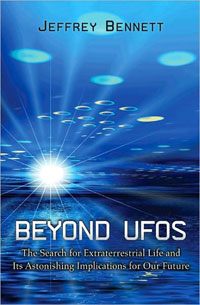|
|
Review: Beyond UFOs
by Jeff Foust
Monday, March 31, 2008
Beyond UFOs: The Search for Extraterrestrial Life and Its Astonishing Implications for Our Future
by Jeffrey Bennett
Princeton Univ. Press, 2008
hardcover, 238 pp., illus.
ISBN 978-0-691-13549-6
US$26.95
Few terms in the space vocabulary are as polarizing as this three-letter acronym: UFO. For some, it represents not just Unidentified Flying Objects, but a virtual universe of extraterrestrial visitations, alien abductions, and—of course—a vast web of government and multinational conspiracies to deny their presence. To others, it’s a symbol of hoaxes and fantasies or, at best, wishful thinking. For those in the latter camp, there might be some trepidation to pick up a book titled Beyond UFOs. Rest assured, though: despite the presence of that three-letter acronym, this book is actually a solid, factually-based look at the science of astrobiology and the prospects for life—intelligent or otherwise—elsewhere in the universe.
Bennett, a scientist and educator, does spend some time early in the book dealing with the UFO mystique. While unwilling to absolutely rule out the chance that some of the many sightings made over the decades might be extraterrestrial visitors, he is unconvinced by the evidence. “The bottom line is that virtually any claim of ‘hard’ evidence of alien visitation quickly collapses under its own weight of implausibility,” he writes, adding, “even if UFOs are real, we probably won’t be able to find the hard evidence that science demands to prove it.”
| Bennett is optimistic about the prospects, if not for alien life then for our own. |
Having dispatched that issue, he lives up to the title of the book and moves on to the general issue of whether life could exist beyond Earth, and if so, where. Bennett approaches the topic straightforwardly, first addressing what “life” is, how it can get started and what planetary conditions are required to support it. He then examines potential abodes for life elsewhere in the solar system (including Mars as well as Europa, Titan, and Enceladus) and in extrasolar planets around other suns. He is skeptical of the “rare Earth” hypothesis that argues that Earth-like planets are uncommon, but notes we lack enough data to be able to determine if it is correct or not.
The book closes out with a discussion of the search for extraterrestrial intelligence as well as what’s known as the Fermi Paradox: if intelligence life exists and is widespread in the universe—that is, that humans aren’t so special—where are they? There is no good answer to that question, but Bennett is optimistic about the prospects, if not for alien life then for our own. “I’ve found scientific reasons to think that there’s a good chance, perhaps a very good chance, that we stand today on the verge of making contact with a civilization that predates ours by millions or billions of years,” he writes in the book’s conclusion. “And even if this turns out not to be the case… we ourselves are positioned to become the galactic colonists, if only we can solve our current problems and mature as a species.” While that belief may not be as on the same solid scientific ground as the rest of Beyond UFOs, it’s also one that doesn’t require believing in flying saucers and little green men.
Jeff Foust (jeff@thespacereview.com) is the editor and publisher of The Space Review. He also operates the Spacetoday.net web site and the Space Politics and Personal Spaceflight weblogs. Views and opinions expressed in this article are those of the author alone, and do not represent the official positions of any organization or company, including the Futron Corporation, the author’s employer.
|
|
